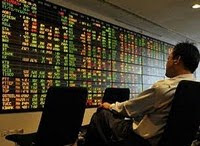A stock exchange is a corporation or mutual organization which provides "trading" facilities for stock brokers and traders, to trade stocks a
 nd other securities. Stock exchanges also provide facilities for the issue and redemption of securities as well as other financial instruments and capital events including the payment of income and dividends. The securities traded on a stock exchange include: shares issued by companies, unit trusts, derivatives, pooled investment products and bonds. To be able to trade a security on a certain stock exchange, it has to be listed there. Usually there is a central location at least for recordkeeping, but trade is less and less linked to such a physical place, as modern markets are electronic networks, which gives them advantages of speed and cost of transactions. Trade on an exchange is by members only. The initial offering of stocks and bonds to investors is by definition done in the primary market and subsequent trading is done in the second.
nd other securities. Stock exchanges also provide facilities for the issue and redemption of securities as well as other financial instruments and capital events including the payment of income and dividends. The securities traded on a stock exchange include: shares issued by companies, unit trusts, derivatives, pooled investment products and bonds. To be able to trade a security on a certain stock exchange, it has to be listed there. Usually there is a central location at least for recordkeeping, but trade is less and less linked to such a physical place, as modern markets are electronic networks, which gives them advantages of speed and cost of transactions. Trade on an exchange is by members only. The initial offering of stocks and bonds to investors is by definition done in the primary market and subsequent trading is done in the second.The role of stock exchanges
Stock exchanges have multiple roles in the economy; this may include the following;
Raising capital for businesses
Mobilizing savings for investment
Facilitating company growth
Profit sharing
Corporate governance
Creating investment opportunities for small investors
Government capital-raising for development projects
Barometer of the economy
 Since the stock market crash of 1929, brokers on American exchanges have had the obligation to assure an orderly and fair market by intervening when the price of a stock seems to be rising or falling too fast. See Stock market for practical discussion of what is bought and sold and how.
Since the stock market crash of 1929, brokers on American exchanges have had the obligation to assure an orderly and fair market by intervening when the price of a stock seems to be rising or falling too fast. See Stock market for practical discussion of what is bought and sold and how.NASDAQ
The NASDAQ (National Association of Securities Dealers Automated Quotation System) is not an exchange in this sense. It is an ongoing computer record of stock quotes (current buy and sell
 prices) for a large number of companies. Brokers can use these quotes to guide them in filling their clients' orders.
prices) for a large number of companies. Brokers can use these quotes to guide them in filling their clients' orders.NASD
The NASD also has a quotation system for the stocks of smaller companies, which is called the OTC (Over the Counter) Bulletin Board. A company does not have to meet very high standards to be listed there, although the NASD has since January 1999 required that listees at least file current financial information with the SEC or other regulatory agencies. Now, many of the companies listed in these secondary sources are in fact failing and some of them have been used in price-manipulating frauds. But many are sound businesses with stocks that do not trade at high enough prices or in large enough volumes to require listing on major exchanges. In the tech-stock recession of spring 2001, some computer and internet companies were delisted by the NASDAQ and added to the OTC Bulletin Board because the price of their stocks fell to pennies on the dollar. Some may be relisted in the future.
American Stock Exchange

AMEX, the American Stock Exchange, is now a subsidiary of the National Association of Security Dealers. It has specialists to process orders in 1000 or so stocks and bonds and also trades what are known as options and derivatives, various sales contracts conditioned on some future value of a stock or bond. Once known as "the curb exchange," it represents a broader spectrum of American business than the NYSE because it handles the offerings of companies that do not qualify for listing on "the big board."
Chicago
Chicago is the United States' second major financial city. The Chicago Board of Trade (CBOT) and the Chicago Mercantile Exchange (CME) were both founded as grain markets. The CBOT
 now handles heavy trading in financial futures and options including those based on United States government and agency bonds. The Chicago Board of Trade has also created a separate exchange, CBOE Chicago Board Options Exchange which trades in a number of options but is best known as the primary marketplace for options based on market indices such as the Dow Jones.
now handles heavy trading in financial futures and options including those based on United States government and agency bonds. The Chicago Board of Trade has also created a separate exchange, CBOE Chicago Board Options Exchange which trades in a number of options but is best known as the primary marketplace for options based on market indices such as the Dow Jones.Other American stock exchanges
Philadelphia Stock Exchange
Pacific Exchange
Boston Stock Exchange



No comments:
Post a Comment